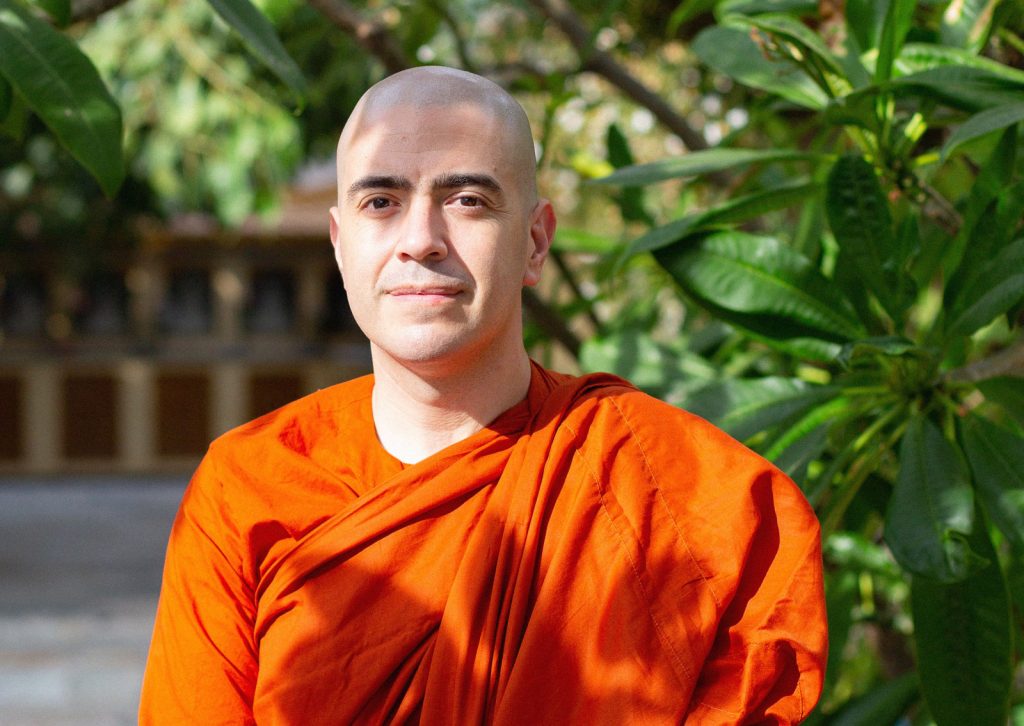What do we do when we do find ourselves experiencing unwholesome states? For example, what happens when we see something that triggers an unpleasant feeling, and an unwholesome state arises in the mind? [We can consider] pahana, which means removal or elimination. You might think about it as selective thinking. Instead of thinking or entertaining whatever thought arises in the mind, we can actively generate and choose to think the thoughts we want to think.
[To this end,] the Buddha speaks of samma sankappa, which is sometimes called right thinking or right motivation and is part of the eightfold path. Within this he gives us three thoughts that we can focus on. The first is nekkhamma, or renunciation. The second is avyapada, a thought of non-hatred or non-ill will. (If this sounds too abstract, think of it as metta, lovingkindness, or benevolence.) The third is ahimsa, nonviolence or non-cruelty, which is a thought of compassion.
We see this advice play out in a sutta in the Majjhima Nikaya called the Dvedhavitakka Sutta, or the sutta on two types of thinking, when the Buddha was reflecting on the time before he became a Buddha. (He says, “When I was only a bodhisattva…” Bodhisattva means someone aspiring to be a Buddha, particularly someone on the path to becoming a sammasambuddha [or a fully enlightened one].)
The Buddha was conducting experiments in his mind, and one of his first experiments was meditating on greediness, hatred, and violence. When he let these thoughts play out in his mind, he noticed he didn’t feel good. He wasn’t getting further in his spiritual quest, and he was getting even further away from what he was trying to achieve.
So, then he said, “I’m going to put those thoughts aside. Putting those aside, let me cultivate the opposite kind of thoughts: Instead of greed, a thought of renunciation, or letting go; instead of anger, a thought of lovingkindness; and instead of cruelty or violence, a thought of compassion or kindness towards others.” When he practiced this way, he noticed that he felt better and was able to overcome thoughts of greed, hatred, and cruelty.
We see two things in this sutta: sabbapapassa akaranam, avoiding the bad, greedy, angry, and cruel thoughts; and ku salassa upasampada: generating wholesome thoughts, or thoughts of renunciation, lovingkindness, and compassion.
We can also connect this to the first two verses of the Dhammapada. As the Buddha tells us in the first verse of the Dhammapada, “If you think in an unskillful way, then suffering follows you.” Then he says, “But if you think in a skillful way, happiness follows you.” Happiness will come to those who think in the proper or wholesome way, which is thinking thoughts of renunciation, lovingkindness, and compassion.
We don’t try to fight unwholesome thoughts, resist them, or push them away. It’s very hard not to think a thought that you’re not supposed to think. If you say, “Don’t think of an elephant,” you start thinking about an elephant. So instead of doing that, we think of something skillful, nice, pleasant, or pleasurable, even. We think of something that’s going to bring tranquility and relaxation (passaddhi), something that’s going to bring joy and rapture (piti), or something that’s going to bring happiness (sukha).
And it’s not just about saying in your mind, “May all beings be well, happy, comfortable, and peaceful. ” Then we’re just parroting, and a parrot doesn’t really understand what it’s saying. The important part is that thinking in this way and using this concept to trigger and feel that blameless happiness: passaddhi, piti, and sukha in the mind.
These thoughts of renunciation and letting go feel very good. It’s a blameless pleasure because they’re not dependent on sensuality. They don’t bring harm to anyone else or ourselves. So we need to rejoice—anumodana—in these wholesome actions. Even thinking in this way is a meritorious deed. It brings a lot of merit, or punna. It creates a lot of good actions, or kusalakamma.
In other words, when we sit and practice and think like this, we really want to get the taste of it. We want to feel it in the body. We want to feel that lovingkindness and compassion, connect with it, soak it up, and let it cover our whole body. You can indulge in it because there’s nothing bad about it. No one’s getting hurt. In fact, it’s going to help you speak kindly, behave kindly, and be in this world in a more peaceful, compassionate way.
So don’t be afraid of any pleasant experiences that arise. Actually focus on that pleasantness. Focus on that feeling of joy. Focus on that experience, and then you can just leave the thinking behind. You can push the cognitive aspect of the practice of “may I be well, may other beings be well, may they be free from suffering” to the background and get into the experiential part of lovingkindness and compassion. By doing that, not only will you be able to replace unwholesome states in the mind, but you’ll also be able to protect yourself because when you’re in this wholesome experience, it is very difficult for an unwholesome experience to take over.
♦
Adapted from Bhante Sanathavihari’s “Right Effort: Understanding an Often Overlooked Mental Discipline on the Eightfold Path.”
Thank you for subscribing to Tricycle! As a nonprofit, we depend on readers like you to keep Buddhist teachings and practices widely available.
